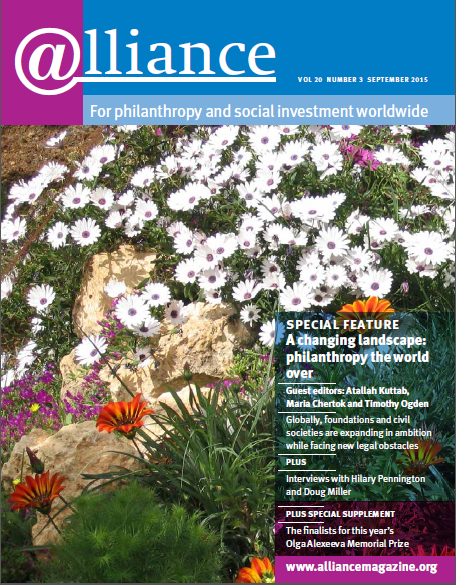It is the best and worst of times for global philanthropy. Philanthropy is spreading to new frontiers, but scores of countries are imposing regressive laws that limit the ability of foundation-funded civil society organizations (CSOs) to operate. Philanthropists are coming together to act strategically as responsible global citizens, but at the same time their ability to move money across borders is restricted. Companies and wealthy individuals are increasingly harmonising the ethics of their giving with the way they do business while conversely, governments are increasingly prioritizing the interests of business over the rights of CSOs and the donors who support them.
These are unprecedented times for philanthropy. The advancement of communication technologies, the Internet in particular, as well as expansion in international travel and the rise of global business, has led to the globalization of ideas. The notion that people should be free to use their money to try to change the world for the better has flourished, creating the potential for a global awakening in philanthropy. Government leaders increasingly recognise that philanthropy offers both risks and opportunities for their authority and their responses to both are driving contradictory global trends. This has created a confused legal environment in some countries – governments are improving the conditions for philanthropy in some ways, while undermining donors in others.
The opportunity for governments ‘We face a one-off opportunity to engage people in positive experiences of giving.’
The opportunity for creating a culture of philanthropy is undoubtedly profound. The growing global cohort of billionaires has the capacity to provide huge philanthropic resources, prompting initiatives like the Giving Pledge commitment by the wealthy to contribute the majority of their incomes to the public. This is of course a worthy endeavour, but the potential runs far deeper than this.
If the rapidly expanding global middle classes were to dedicate one per cent of their spending to charitable activities, by 2030 this could raise as much as half a trillion dollars annually, according to CAF’s 2013 report, Unlocking the potential of global philanthropy. We face a one-off opportunity to engage people in positive experiences of giving as they come into relative wealth so that they might develop a mutually reinforcing association between wealth and philanthropy.
A positive vision of the future is reachable. A number of hugely significant developing economies have seen dramatic increases in the proportion of people making regular donations to CSOs in recent years – by 28 percentage points in Malaysia, 21 in Indonesia, 9 in India, 8 in South Africa and 5 in Vietnam, according to the World Giving Index. Many nations have introduced legal systems supportive of philanthropy and are helping citizens to transition from informal charity to philanthropic giving.
‘Many nations have introduced legal systems supportive of philanthropy.’
Governments are not blind to the potential of philanthropy and, despite what recent news articles would suggest, they are overwhelmingly in favour of encouraging people and companies to give more. To compete in a globalized economy, governments are forced to offer favourable tax rates. The average global corporation tax rate has fallen from 27.5 per cent in 2006 to 23.7 per cent in 2015 and personal income tax has fallen by 1.4 percentage points over the same period, according to KPMG. At the same time, states are faced with the challenge of maintaining and improving infrastructure, education and welfare to create a healthy and productive society that is conducive to growth. In such an environment, policies that boost giving to causes that augment states’ capacity to provide services are likely to benefit governments. Indeed, the clearest sign that governments are keen to encourage philanthropy is the fact that they are increasingly willing to forgo tax revenues in an attempt to catalyse increased giving. Most states that impose income taxes also support incentives for philanthropy, according to the 2014 Rules to Give by Index. Sixty-six per cent offer tax incentives to individuals and 77 per cent offer incentives to companies. Nations that offer such incentives have a higher incidence of charitable giving than those that do not, according to the index.
The risk for governments
Buffeted by global economic and geo-political forces, many governments seem to be increasingly aware that philanthropy is needed to fund vital services. However, at the same time, other aspects of globalization, particularly the proliferation of communication technologies, have eroded governments’ ability to limit dissent. Philanthropy, a vehicle for calling for greater freedoms and an important example of that freedom, inevitably is in the crosshairs of governments keen to allow donors to support public services but hesitant to loosen control over the national moral and political narrative. As a result, many nations are introducing policies that encourage donations to service-based causes while restricting philanthropy that supports advocacy and campaigning activities.
‘Governments seem to be increasingly aware that philanthropy is needed to fund vital services.’
Many donors’ activities are affected when the organizations they fund respond to changing environments on the ground. Increasingly, governments are targeting organizations that engage in advocacy by introducing laws that either prohibit criticism of government policy or introduce uncertainty about what is, and what is not allowed. While many countries have long outlawed advocacy by CSOs, nations such as Algeria, Azerbaijan, Ecuador and Indonesia have recently sought to implement additional regressive policies. Even nations with reputations for nurturing civil society exhibit this trend. In 2014, the United Kingdom introduced what is known as the Lobbying Act, which requires organizations that plan to exceed financial limits set on policy advocacy during a year preceding a national election to account for the spending and register with the Electoral Commission. Similarly, in Canada, a number of organizations say their charitable status is threatened even though they campaign on issues core to their legitimate charitable mission.
In almost all nations, party political lobbying of the electorate by CSOs is illegal, but there is a major difference between campaigning for a party or a politician and engaging in advocacy that is squarely related to an organization’s charitable goals. Increasingly, the word ‘political’ has become a pejorative term because governments wilfully conflate partisan political lobbying with legitimate policy advocacy. The distinction of service-orientated from advocacy-orientated philanthropy is a false one, propagated by critics of philanthropy and sadly, all too often by philanthropists themselves as proponents of one model for achieving change expose what they feel are the weaknesses of others.
While the conflating of electoral lobbying with political advocacy may be effective in silencing organizations, it offers no protection from public disorder. In fact, it might actually make unrest more likely. The experience of successive Egyptian governments should attest to the fact that silencing civil society is akin to disabling a pressure valve on a large piece of industrial equipment; you replace the regular release of steam with the risk of an uncontrolled explosion. Combined with the fact that many potential investors see the presence of a strong and vibrant civil society as a key indicator of a good-governance environment for business, the motivations for laws that restrict the advocacy by CSOs seem wrongheaded. We need to do more to make a case for the stabilizing role philanthropy and civil society can play in turning dissenting voices into useful and constructive dialogues.
Domestic donor restrictions limit activities funded, and barriers to cross-border philanthropy are much more direct. In recent years diverse nations have introduced laws restricting the influence of foreign donors. In this edition of Alliance, we highlight a number of examples of this worrying trend. In his article Douglas Rutzen details the range of measures used by what the International Center for Non-profit Law (ICNL) estimates to be more than 30 new countries since 2012, to restrict the influence of foreign donors. We also look more closely at some specific examples.
Counterforces
Contradictory trends at play in government policy towards philanthropy may seem like an academic curiosity for citizens in nations where the regulations are less ambiguous. However, for many, policy making at the national level has an apparently split personality – nurturing philanthropy with one hand and throttling it with the other.
In this issue of Alliance magazine we detail some of the most regressive and progressive recent policies relating to philanthropy. It is striking that some nations imposing the most egregious laws to restrict advocacy and foreign funding, are also legislating to make giving easier, more tax effective and more flexible. At the same time, higher maximum funding caps for charitable deductions and experimentation with more flexible requirements for CSO registration in Guangdong suggest a more positive counter-narrative. Equally, while Ingrid Srinath from Hivos India details worrying developments in India relating to increased scrutiny of organizations receiving foreign donations, an article by Carmen Perez on corporate profit-sharing describes India’s 2013 Companies Act, which compels Indian companies to dedicate 2 per cent of their profits to corporate social responsibility.
Distorting factors
It is easy to criticise restrictions on philanthropy in a globalizing world as short sighted, but some extra vigilance is surely justified. Terrorist groups have been able to take advantage of opportunities offered by the Internet to spread their message, organize and inculcate fear. They’ve also used gaps in cross-border financial systems to raise fortunes through money laundering and the illicit sale of plundered resources. Following the tragic attack on the World Trade Center in New York City in 2001, the Financial Action Task Force (FATF), a global anti-money laundering body, updated its recommendations to address counter-terrorism measures. The eighth of these recommendations deals specifically with ‘non-profit organizations’ and states that they are ‘particularly vulnerable, and countries should ensure that they cannot be misused’. Though no sector should be exempt from safeguards, the singling out of CSOs in this and other FATF documents as being at particular risk without sufficient evidence to back up such a presumption, has arguably resulted in restricted access to financial services for legitimate organizations. To illustrate the problem, Ed Pomfret of Oxfam examines the impact of FATF on remittance services to Somalia.
Clearly, nobody would suggest that philanthropy should not be subject to scrutiny, and if there is a risk that it could be used as a Trojan Horse for terrorist financing, regulation and compliance procedures in banks must be robust enough to maintain donor trust. However, there is a real danger that without moderation, recommendation eight could be used as a smoke-screen for undue restrictions on foreign donations. The growing number of governments that have cited FATF in recent regressive laws substantiates the risk.

Egyptian governments should attest to the fact that silencing civil society is akin to disabling a pressure valve on a large piece of industrial equipment; you replace the regular release of steam with the risk of an uncontrolled explosion.
Stepping up
Globally, barriers to philanthropy seem to be increasing in parallel to opportunities. We face a unique opportunity to create an enabling environment for giving that will guarantee a bright future for civil society. Our success or failure in this endeavour may help determine our capacity to deliver sustainable development, prosperity, peace and justice for future generations. That is a future that we all have a vested interest in and our response to the closing space for philanthropy and civil society must therefore be inclusive.
If we are able to speak up in defence of the rights of others to pursue their causes, even those with which we do not wholly agree, history has shown we are likely to succeed.
For too long, some of us in the wider philanthropy circles have sat on the sidelines persuading ourselves that the issues discussed in this article and others in this issue of Alliance magazine are relevant to human rights funders and CSOs, but outside of our core interests. We should recognise that if we wait to be dragged into the battle, we may condemn ourselves to losing. It needn’t be this way. To some extent the closing space for philanthropy and civil society is a fear response by governments to the rising power of donors and of the collective will of society. If we are able to speak up in defence of the rights of others to pursue their causes, even those with which we do not wholly agree, history has shown we are likely to succeed. In the past, philanthropy-funded battles against slavery, apartheid and, more recently, homophobia have turned the tide against what seemed like intractable opposition. We need to rediscover solidarity to protect the rights of foundations and the CSOs we fund.
Adam Pickering is international policy manager officer for the Charities Aid Foundation, and member of the Alliance editorial board. Email apickering@cafonline.org
Main image: Protestors dressed as UK Chancellor George Osborne call for action on hunger as part of CAFOD’s IF campaign. Many argue the UK Lobbying Act restricts such campaigning activities in the run‑up to elections.







Comments (0)